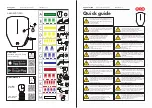
5 57
Driving your vehicle
Weight of the trailer
How heavy can a trailer safely be? It
should never weigh more than the maxi-
mum trailer weight with trailer brakes. But
even that can be too heavy.
It depends on how you plan to use your
trailer. For example, speed, altitude, road
grades, outside temperature and how
often your vehicle is used to pull a trailer
are all important. The ideal trailer weight
can also depend on any special equip-
ment that you have on your vehicle.
Weight of the trailer nose
The nose weight of any trailer is an
important weight to measure because it
affects the total gross vehicle weight
(GVW) of your vehicle. This weight
includes the kerb weight of the vehicle,
any cargo you may carry in it, and the
people who will be riding in the vehicle.
And if you will tow a trailer, you must add
the nose weight to the GVW because
your vehicle will also be carrying that
weight.
The trailer nose should weigh a maxi-
mum of 10% of the total loaded trailer
weight, within the limits of the maximum
trailer nose weight permissible. After
you've loaded your trailer, weigh the trail-
er and then the nose, separately, to see
if the weights are proper. If they aren’t,
you may be able to correct them simply
by moving some items around in the trail-
er.
WARNING -
Trailer
• Never load a trailer with more
weight in the rear than in the
front. The front should be loaded
with approximately 60% of the
total trailer load; the rear should
be loaded with approximately
40% of the total trailer load.
• Never exceed the maximum
weight limits of the trailer or trail-
er towing equipment. Improper
loading can result in damage to
your vehicle and/or personal
injury. Check weights and loading
at a commercial scale or motor-
way patrol office equipped with
scales.
• An improperly loaded trailer can
cause loss of vehicle control.
C190E02JM
Gross Axle Weight
Gross Vehicle Weight
C190E01JM
Nose Weight
Total Trailer Weight
















































